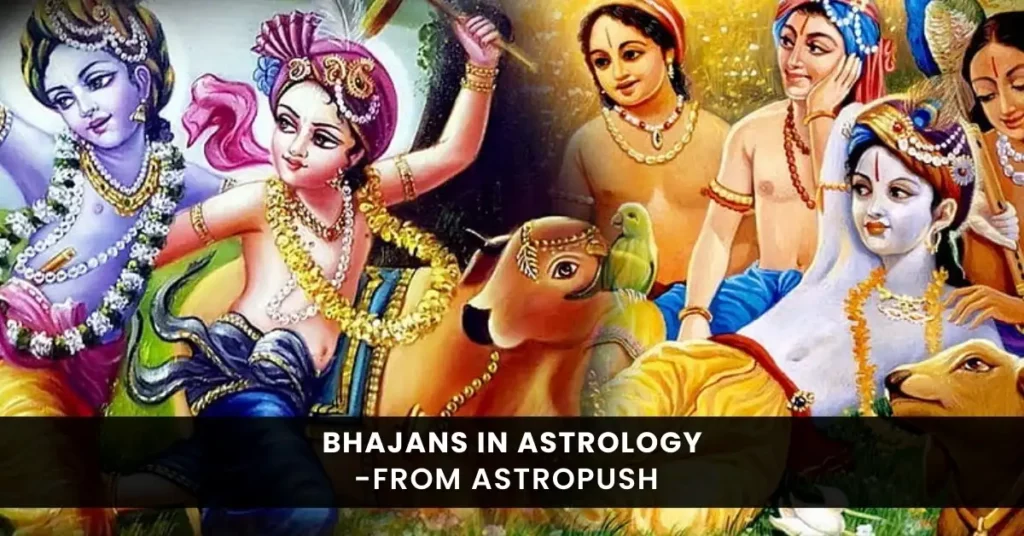Bhajans, unique and special songs, are sung by individuals as a means to express their deep love and devotion to God or a higher power. Moreover, these songs hold significant cultural and spiritual importance, playing a crucial role in the spiritual practices of many groups. Additionally, the term “bhajan” is derived from Sanskrit, where “Bhaj” signifies the act of worship and adoration. When people sing bhajans, they engage in a form of musical devotion, creating a connection with the divine through the expression of their feelings and reverence. In essence, bhajans serve as a heartfelt means of connecting with the spiritual realm, embodying the cultural and spiritual richness of the traditions from which they originate.
Significance of Bhajans
- Devotional Focus: Bhajans, being songs that express love and devotion to a specific deity, serve to emphasize divine qualities, thereby strengthening the connection with the divine. Additionally, these songs hold a revered place in spiritual practices, acting as a medium to foster a deeper spiritual connection.
- Diverse Themes: Covering a range of topics such as the greatness of God, the beauty of nature, the importance of goodness, and virtuous living, bhajans vary based on the associated deity or religious tradition.
- Musical Diversity: Bhajans, sung in various styles such as classical or folk music, feature traditional instruments like the harmonium and tabla. Moreover, this diversity creates a unique atmosphere that significantly enhances the spiritual experience, allowing individuals to immerse themselves deeply in devotion and connect more profoundly with the divine.
- Community Participation: Bhajans are often sung collectively in places like temples or during religious events. This communal singing fosters unity and shared devotion among participants.
- Spiritual Upliftment: The primary goal of bhajans is to uplift spirits and deepen connections to God. Furthermore, the act of singing devotional lyrics and listening to melodic tunes creates a peaceful atmosphere, making it ideal for meditation and prayer.
- Cultural Significance: Integral to India’s culture and religion, bhajans play a vital role in festivals, religious ceremonies, and spiritual practices.
- To Connect with God: Beyond group singing, bhajans serve as a personal means for individuals to connect with God. Moreover, many incorporate bhajan singing into their daily routines as a way to express gratitude, seek guidance, and feel a profound connection with the divine. Additionally, the introspective nature of bhajan singing allows individuals to delve deep into their spiritual journey, fostering personal growth and inner peace.
Bhajans bridge generations, reflecting India’s cultural evolution, preserving religious aspects, narratives, moral lessons, and cultural histories passed down through centuries.
Uniting People Across Cultures and Beliefs
- Storytelling Tradition: Bhajans serve as a form of storytelling, effectively passing on spiritual teachings and cultural values from one generation to the next through melodious tunes.
- Inclusive Harmony: Bhajan singing brings together people from diverse backgrounds, promoting harmony and mutual respect. Furthermore, this shared experience transcends religious and cultural differences, fostering a broader sense of community and understanding. Additionally, the communal aspect of bhajan singing encourages individuals to appreciate and celebrate diversity, contributing to the creation of a more inclusive and compassionate society.
- Adaptability in Expression: Bhajans adapt to contemporary musical styles while preserving their spiritual essence. This flexibility allows them to resonate with individuals of varying musical preferences, making bhajans a living tradition relevant in today’s diverse cultural landscape.
- Cultural Bridge: Bhajans are more than just songs of devotion; they are living cultural artifacts that bridge the spiritual and social aspects of life. They connect individuals across time, fostering a shared sense of identity and belonging within the rich tapestry of Indian culture.
- Potent Expression of Devotion: In essence, bhajans are powerful and heartfelt songs that enable people to express their devotion, celebrate spirituality, and feel a strong connection to their community and cultural traditions in India.
Advantages of Engaging in Bhajan Singing
Bhajans go beyond just nice tunes – they have a lot of good things for us, especially in our hearts and spirits. Bhajans are like magic melodies that don’t just sound good; rather, they help keep our culture alive, make us feel better inside, and bring joy to our celebrations. Additionally, these enchanting tunes serve as a bridge between past and present, preserving age-old traditions while also infusing contemporary life with spiritual richness.
- Joyful Expression: Singing bhajans brings joy and happiness, thereby allowing individuals to express their devotion in a melodious way.
- Spiritual Connection: Bhajans not only help deepen the connection to God or a higher power but also provide a meaningful and spiritual experience.
- Community Bonding: Singing bhajans together fosters a sense of togetherness and unity within the community, thus creating strong bonds among participants.
- Cultural Preservation: Moreover, bhajans contribute significantly to preserving cultural values and traditions, passing them down through the generations.
- Stress Relief: Additionally, the act of singing bhajans can be relaxing and stress-relieving, creating a peaceful atmosphere conducive to meditation and prayer.
- Inclusive Practice: Furthermore, bhajan singing is inclusive, bringing people from diverse backgrounds together, promoting harmony, and transcending differences.
- Personal Reflection: Bhajans offer a personal space for reflection, enabling individuals to connect with their inner selves, express gratitude, and seek guidance.
- Adaptability: Notably, bhajans can adapt to different musical styles, making them relevant and enjoyable for people with varying musical preferences.
- Cultural Identity: By participating in bhajan singing, individuals not only contribute to the preservation of their cultural identity but also form a connection to the rich cultural tapestry of India.
- Emotional Upliftment: Finally, bhajans have the power to uplift spirits, providing emotional solace and a sense of peace to those who engage in singing or listening to them.
Dos and Don’ts for a Fulfilling Bhajan Experience:
Dos:
- Respect the Activity: Firstly, remember that singing bhajans is a special and meaningful activity that deserves the utmost respect.
- Learn the Words: Secondly, take the time to familiarize yourself with the words of the bhajan you’re singing. Understanding the meaning adds significant depth to your experience.
- Sing from the Heart: Thirdly, sing with sincerity and genuine devotion. Focus intently on expressing your feelings rather than merely showcasing your singing skills.
- Active Participation: Additionally, be actively involved in the singing. Your enthusiastic participation significantly contributes to the positive energy of the group.
- Follow the Leader: Moreover, if someone is leading the singing, it’s essential to follow their lead. Doing so helps maintain harmony and ensures everyone sings together smoothly.
- Create a Peaceful Environment: Furthermore, select a place that’s quiet and calm for bhajan singing. A tranquil atmosphere significantly enhances the reflective nature of the activity.
- Respect Different Beliefs: It’s also crucial to be open to the fact that bhajans can be associated with various beliefs. Respectfully acknowledging and appreciating the diversity of perspectives within the group fosters harmony.
- Encourage Others: Lastly, invite and encourage others to join in the singing. Cultivating an inclusive atmosphere makes the experience more enriching for everyone involved.
Don’ts:
- Avoid Disruptive Behavior: Stay away from actions that might disturb the peaceful atmosphere, such as talking loudly or engaging in unrelated activities.
- Minimize Distractions: Keep distractions, like phones and unrelated conversations, to a minimum during bhajan sessions. This helps maintain focus.
- Refrain from Judging Others: Avoid criticizing how others sing. The focus should be on the collective devotion rather than individual performance.
- Check Your Ego: Remember that bhajan singing is about everyone coming together. Consequently, it’s important to keep your ego in check and fully enjoy the collective experience.
- Be Mindful of Cultural Sensitivities: Respecting the cultural aspects of bhajans and the various religious practices within the group is paramount, as it fosters harmony and understanding among participants, thereby creating a more inclusive and cohesive community.
- Dress Appropriately: Wear clothing that is modest and suitable for the spiritual setting. It shows respect for the importance of the bhajan session.
- Maintain a Steady Pace: Bhajans, like magic melodies, not only sound good but also help keep our culture alive, make us feel better inside, and bring joy to our celebrations. Through their melodious tunes and profound lyrics, bhajans uplift our souls and bring us closer to the divine. Furthermore, avoiding rushing through the bhajan is essential because singing at a steady pace allows for a thoughtful and calming experience, enabling us to fully absorb the spiritual essence of the practice.
- No Competition: Remember that bhajan singing is not a competition. Focus on the shared spiritual journey instead of trying to outshine others.
Commonly sung bhajans for the deities:
“Om Jai Jagdish Hare” – Invocation to Lord Vishnu for the well-being of all living beings.
“Hey Ram Hey Ram” – A soothing prayer calling upon Lord Rama for guidance.
“Jai Ganesh Jai Ganesh Deva” – An invocation to Lord Ganesha for the removal of obstacles.
“Tere Man Mein Ram” – Encourages keeping Lord Rama in the heart, emphasizing devotion.
“Achyutam Keshavam” – A melodious praise of Lord Krishna, acknowledging his eternal qualities.
“Bhaja Govindam” – A philosophical hymn urging seekers to worship Lord Govinda for liberation.
“Raghupati Raghav Raja Ram” – Homage to Lord Rama, promoting righteousness.
“Mere Ghar Aana Pyare Nandlala” – Inviting Lord Krishna into one’s home with love.
“Shyam Teri Bansi Pukare Radha Naam” – Divine call of Lord Krishna’s flute and Radha’s name.
“Jai Radha Madhav” – Celebration of the divine love between Radha and Krishna.
“Satyam Shivam Sundaram” – Acknowledging the divine truth and beauty in all aspects of life.
“Govinda Bolo Hari Gopala Bolo” – Chanting the names of Lord Krishna and Govinda with devotion.
“Jag Mein Sundar Hai Do Naam” – Recognizing the beauty of the divine names, Rama and Krishna.
“O Palan Hare” – Seeking the protection of the divine caretaker.
“Tumhi Ho Mata Pita Tumhi Ho” – Recognizing the divine as both mother and father.
“Hey Govind Hey Gopal” – Devotion to the divine sung soulfully by Jagjit Singh.
“Shyam Teri Bansi Pukare” – Devotional rendition expressing love for Lord Krishna by Jaya Kishori Ji.
“Maiyya Yashoda” – A playful depiction of Lord Krishna’s childhood.
“Bhole Nath Tumhare Charno Mein” – Devotion to Lord Shiva, seeking refuge at his divine feet.
“Mera Baid Guru Govinda” – Acknowledging the divine as the ultimate healer and Guru.
“Jai Ho Mata Vaishno Devi” – Celebration of the divine mother, Mata Vaishno Devi.
“Om Sai Namo Namah” – Devotion to Sai Baba, seeking his blessings and grace.
“Shri Ram Chandra Kripalu Bhajman” – Praises Lord Rama, describing his divine qualities.
“Radhe Radhe Govinda” – Devotion to Lord Krishna and his divine consort Radha.
“Vakratunda Mahakaya” – Invocation to Lord Ganesha, seeking blessings and obstacle removal.
“Tera Bhawan Saja Jin Phoolon Se” – A prayer to the goddess, describing her divine abode.
“Kabhi Ram Banke Kabhi Shyam Banke” – Devotion to Lord Rama and Lord Krishna.
“Radhe Krishna Radhe Shyam” – Devotion to the divine couple, Radha and Krishna.
“Mere To Girdhar Gopal” – Devotional song expressing love for Lord Krishna, the divine cowherd.
“Guru Meri Pooja” – Devotion to the spiritual teacher, acknowledging their guidance.
“Hey Gobind Hey Gopal” – Devotion to Lord Krishna, the speaker of the Bhagavad Gita.
“Ya Kundendu Tushar” – Invocation to Goddess Saraswati, the embodiment of knowledge.
“Koi Kahe Govind Koi Gopala” – Devotion to Lord Krishna in various forms.
“Ae Malik Tere Bande Hum” – A prayer to the divine as the ultimate caretaker.
“Hare Krishna Hare Rama” – Chanting the divine names for spiritual upliftment.
“Aaye Tere Bhawan” – A prayer to the goddess, seeking blessings and grace.
“Shiv Shankar Ko Jisne Puja” – Devotion to Lord Shiva, recognizing his divine attributes.
“Sai Ram Sai Shyam Sai Bhagwan” – Devotion to Sai Baba, expressing love and gratitude.
“Mangal Bhavan Amangal Haari” – A prayer for the well-being and prosperity of all.
“Shri Krishna Govind Hare Murari” – Chanting the divine names of Lord Krishna for bliss.
“Bhaktamar Stotra” – A hymn praising Lord Adinath, the first Tirthankara in Jainism.
“Ganpati Bappa Moriya” – Celebrating and invoking the blessings of Lord Ganesha.
“Bhagavad Gita Bhajan: Hey Krishna Govind” – Devotion to Lord Krishna, acknowledging his divine form.
“Shiv Bhajan: Bolo Har Har Har” – Chanting the names of Lord Shiva for spiritual elevation.
“Bhagwan Hai Kahan Re Tu” – Seeking the divine presence in times of challenges and uncertainties.
“Lakshmi Mata Bhajan: Om Jai Laxmi Mata” – Invoking the blessings of Goddess Lakshmi for wealth and prosperity.
“Krishna Bhajan: Radhe Radhe Barsane Wali Radhe” – Devotion to Radha and Krishna in their playful form.
“Aao Bhog Lagao Mere Mohan” – Offering bhog (devotional food) to Lord Krishna with love.
“Jogiya Se Pre Ganga” – Devotion to Lord Shiva, the ascetic and the Lord of the Ganges.
“Santoshi Mata Bhajan: Jai Santoshi Mata” – Praises and invocation to Goddess Santoshi for fulfillment of wishes.
“Bhagavad Gita Bhajan: Gopala Radha Lola” – Devotion to Lord Krishna and Radha, celebrating their divine love.
“Shiv Bhajan: Shivji Satya Hai” – Affirming the eternal truth of Lord Shiva’s existence.
“Bhagavad Gita Bhajan: Vasudev Sutam Devam” – Praises to Lord Krishna, the son of Vasudeva.
“Aaja Maa Tenu Ankhiyan Udeek Diyan” – Longing for the divine mother’s presence with love.
“Saraswati Vandana: Ya Kunde” – Invocation to Goddess Saraswati for knowledge and wisdom.
“Radha Krishna Bhajan: Radhe Radhe Japa Karo” – Encouraging the continuous chanting of Radha and Krishna’s names.
“Jab Koi Nahi Aata Mere Sai Aate Hai” – Belief in the divine presence of Sai Baba in times of need.
“Guru Bhajan: Guru Charanam” – Devotion to the lotus feet of the spiritual teacher.
“Kanha Kanha Rat Jayenge” – A playful bhajan expressing love for Lord Krishna.
“Bhagavad Gita Bhajan: Gopala Gopala Devakinandana Gopala” – Devotion to Lord Krishna, the son of Devaki.
“Shiv Bhajan: Hey Shambhu Baba Mere Bhole Nath” – Devotion to Lord Shiva, addressing him as the simple and compassionate one.
“Maiya Teri Jai Jaikaar” – Victory and celebration in praise of the divine mother.
“Jogiya Ban Ke Aaya Sai Ji” – Devotion to Sai Baba, recognizing him as a wandering ascetic.
“Bhagavad Gita Bhajan: Krishna Kripa Kataksha” – Seeking the grace and blessings of Lord Krishna.
“Govind Bolo Hari Gopal Bolo” – Chanting the divine names of Lord Krishna and Govinda.
“Bhagavad Gita Bhajan: Tu Mane Bhagwan Ek Vardan Aapi De” – Seeking the divine blessings and grace.
“Bhagavad Gita Bhajan: Yada Yada Hi Dharmasya” – Reflecting on the teachings of Lord Krishna in the Bhagavad Gita.
“Maiya Ka Chola Hai Rangla” – Celebration of the divine mother’s colorful attire.
“Bhagwan Hai Kahan Re Tu” – Seeking the divine in times of existential questioning.
“Sai Bhajan: Om Sai Ram” – Chanting the sacred name of Sai Baba with devotion.
“Shri Krishna Bhajan: Mithe Ras Se Bhari Radha Rani Lage” – Celebrating the sweet and divine love between Radha and Krishna.
“Bhagavad Gita Bhajan: Hey Krishna Karuna Sindhu” – Seeking the compassion and mercy of Lord Krishna.
“Bhagwan Tumhara Saath Hai” – Affirming the divine presence and support in all aspects of life.
“Ganesha Bhajan: Jai Ganesh Deva” – Offering prayers and praise to Lord Ganesha.
“Bhagavad Gita Bhajan: Aisi Lagi Lagan” – Deep devotion and surrender to Lord Krishna.
“Jai Jai Radha Raman Hari Bol” – Repeating the divine names of Radha and Krishna with joy.
“Bhagavad Gita Bhajan: Shri Krishna Govind Hare Murari” – Chanting the divine names for spiritual upliftment.
“Shiv Bhajan: Shankar Mera Pyara” – Expressing love for Lord Shiva as the beloved one.
“Bhagavad Gita Bhajan: Arjuna Vishada Yoga” – Reflecting on the emotional dilemma of Arjuna in the Bhagavad Gita.
“Radha Krishna Bhajan: Radhe Radhe Bol” – Chanting the divine names of Radha and Krishna with devotion.
“Bhagavad Gita Bhajan: Gopala Gopala” – Devotion to Lord Krishna in his role as the divine protector.
“Shiv Bhajan: Shiv Shankar Ko Jisne Puja” – Devotion to Lord Shiva, recognizing his divine attributes.



